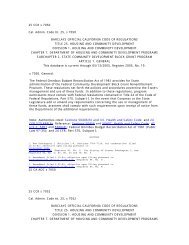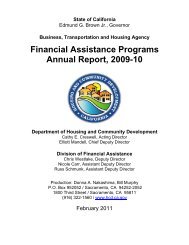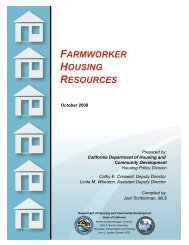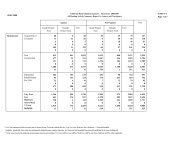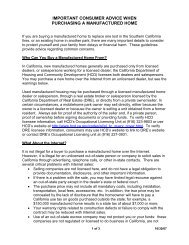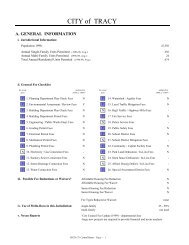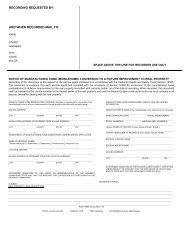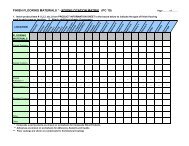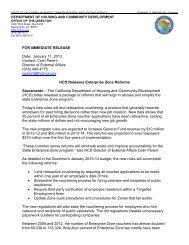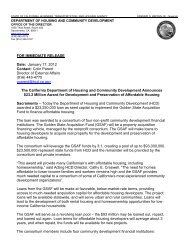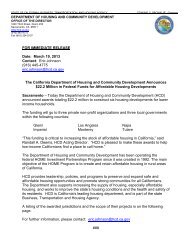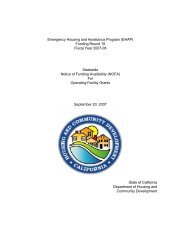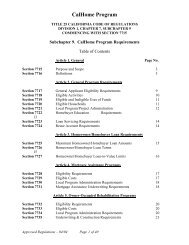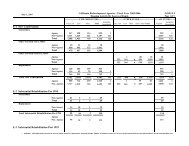Adobe PDF - California Department of Housing and Community ...
Adobe PDF - California Department of Housing and Community ...
Adobe PDF - California Department of Housing and Community ...
You also want an ePaper? Increase the reach of your titles
YUMPU automatically turns print PDFs into web optimized ePapers that Google loves.
PUBLIC REVENUES - REGULATIONS <br />
If a seller <strong>of</strong> hay is also the grower <strong>of</strong> the hay, this exemption shall apply only if either:<br />
(1) The hay is produced for sale only to beef cattle feedlots or dairies, or<br />
(2) The hay is sold exclusively through a farmer-owned cooperative.<br />
(d) Concessionaires. For the purposes <strong>of</strong> this regulation, the term concessionaire is defined as an independent<br />
retailer who is authorized, through contract with, or permission <strong>of</strong>, another retail business enterprise (the prime retailer),<br />
to operate within the perimeter <strong>of</strong> the prime retailer's own retail business premises, which to all intents <strong>and</strong> purposes appear<br />
to be wholly under the control <strong>of</strong> that prime retailer, <strong>and</strong> to make retail sales that to the general public might reasonably<br />
be believed to be the transactions <strong>of</strong> the prime retailer. Some indicators that a retailer is not operating as a concessionaire are<br />
that he or she:<br />
Appears to the public to be a business separate <strong>and</strong> autonomous from the prime retailer. Examples <strong>of</strong> businesses<br />
that may appear to be separate <strong>and</strong> autonomous, while operating within the prime retailer's premises, are those with<br />
signs posted on the premises naming each <strong>of</strong> such businesses, those with separate cash registers, <strong>and</strong> those with<br />
their own receipts or invoices printed with their business name.<br />
Maintains separate business records, particularly with respect to sales.<br />
Establishes his or her own selling prices.<br />
Makes business decisions independently, such as hiring employees or purchasing inventory <strong>and</strong> supplies.<br />
Registers as a separate business with other regulatory agencies, such as an agency issuing business licenses, the<br />
Employment Development <strong>Department</strong>, <strong>and</strong>/or the Secretary <strong>of</strong> State.<br />
Deposits funds into a separate account.<br />
In cases where a retailer is not operating as a concessionaire, the prime retailer is not liable for any tax liabilities <strong>of</strong><br />
the retailer operating on his or her premises. However, if a retailer is deemed to be operating as a concessionaire, the<br />
prime retailer may be held jointly <strong>and</strong> severally liable for any sales <strong>and</strong> use taxes imposed on unreported retail sales<br />
made by the concessionaire while operating as a concessionaire. Such a prime retailer will be relieved <strong>of</strong> his or her<br />
obligation for sales <strong>and</strong> use tax liabilities incurred by such a concessionaire for the period in which the concessionaire<br />
holds a permit for the location <strong>of</strong> the prime retailer or in cases where the prime retailer obtains <strong>and</strong> retains a written<br />
statement that is taken in good faith in which the concessionaire affirms that he or she holds a seller's permit for that<br />
location with the Board. The following essential elements must be included in the statement in order to relieve the prime<br />
retailer <strong>of</strong> his or her liability for any unreported tax liabilities incurred by the concessionaire:<br />
The permit number <strong>of</strong> the concessionaire<br />
The location for which the permit is issued (must show the concessionaire's location within the perimeter <strong>of</strong> the<br />
prime retailer's location).<br />
Signature <strong>of</strong> the concessionaire<br />
Date<br />
While any statement, taken timely, in good faith <strong>and</strong> containing all <strong>of</strong> these essential elements will relieve a prime retailer<br />
<strong>of</strong> his or her liability for the unreported sales or use taxes <strong>of</strong> a concessionaire, a suggested format <strong>of</strong> an acceptable<br />
statement is provided as Appendix A to this regulation. While not required, it is suggested that the statement from the<br />
concessionaire contain language to clarify which party will be responsible for reporting <strong>and</strong> remitting the sales <strong>and</strong>/or<br />
use tax due on his or her retail sales.<br />
In instances where the lessor, or grantor <strong>of</strong> permission to occupy space, is not a retailer himself or herself, he or<br />
she is not liable for any sales or use taxes owed by his or her lessee or grantee. In instances where an independent retailer<br />
leases space from another retailer, or occupies space by virtue <strong>of</strong> the granting <strong>of</strong> permission by another retailer, but<br />
does not operate his or her business within the perimeter <strong>of</strong> the lessor's or grantor's own retail business, such an<br />
independent retailer is not a concessionaire within the meaning <strong>of</strong> this regulation. In this case, the lessor or grantor is<br />
not liable for any sales or use taxes owned by the lessee or grantee.<br />
(e) Agents. If agents make sales on behalf <strong>of</strong> a principal <strong>and</strong> do not have a fixed place <strong>of</strong> business, but travel from<br />
house to house or from town to town, it is unnecessary that a permit be obtained for each agent if the principal obtains<br />
a permit for each place <strong>of</strong> business located in <strong>California</strong>. If, however,; the principal does not obtain a; permit for each<br />
place <strong>of</strong> business located in <strong>California</strong>, it is necessary for each agent to obtain a permit.<br />
(f) Inactive Permits. A permit shall be held only by persons actively engaging in or conducting a business as a<br />
seller <strong>of</strong> tangible personal property. Any person not so engaged shall forthwith surrender his or her permit to the Board<br />
for cancellation. The Board may revoke the permit <strong>of</strong> a person found to be not actively engaged in or conducting a<br />
business as a seller <strong>of</strong> tangible personal property.<br />
Upon discontinuing or transferring a business, a permit holder shall promptly notify the Board <strong>and</strong> deliver his or her<br />
permit to the Board for cancellation. To be acceptable, the notice <strong>of</strong> transfer or discontinuance <strong>of</strong> a business must<br />
be received in one <strong>of</strong> the following ways:<br />
(1) Oral or written statement to a Board <strong>of</strong>fice or authorized representative, accompanied by delivery <strong>of</strong> the permit,<br />
or followed by delivery <strong>of</strong> the permit upon actual cessation <strong>of</strong> the business. The permit need not be delivered to the<br />
Board, if lost, destroyed or is unavailable for some other acceptable reason, but notice <strong>of</strong> cessation <strong>of</strong> business must be<br />
given.<br />
(2) Receipt <strong>of</strong> the transferee or business successor's application for a seller's permit may serve to put the Board<br />
on notice <strong>of</strong> the transferor's cessation <strong>of</strong> business.<br />
Notice to another state agency <strong>of</strong> a transfer or cessation <strong>of</strong> business does not in itself constitute notice to the Board.<br />
Unless the permit holder who transfers the business notifies the Board <strong>of</strong> the transfer, or delivers the permit to the Board<br />
for cancellation, he or she will be liable for taxes, interest <strong>and</strong> penalties (excluding penalties for fraud or intent to evade<br />
the tax) incurred by his or her transferee who with the permit holder's actual or constructive knowledge uses the permit<br />
168



